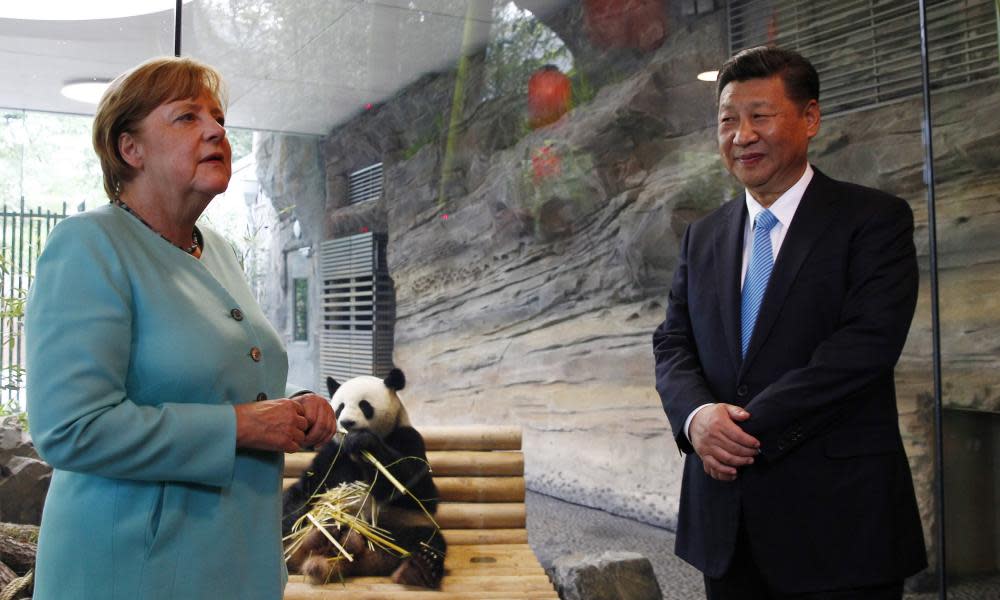Panda fever grips Berlin on Chinese president's trip to Germany

Already their names – Meng Meng and Jiao Qing – slide easily off the tongues of young Berliners, a reflection of the huge build-up there has been ahead of the unveiling of the pair of young giant pandas in the German capital on Wednesday.
Panda fever, which has gripped the city for weeks, reached its peak when the red velvet curtain of their €9m (£7.9m) glass enclosure was drawn to reveal the bamboo-chewing newcomers – a three-year-old female and a seven-year-old male – unaware of the considerable diplomatic responsibility that has been placed upon their shoulders.
The two bears were oblivious to the fact they they were being cooed over by two of the world’s most powerful leaders, along with other VIPs who emitted loud gasps of delight as they peered into the panda pavilion and watched them tear enthusiastically at their food.
Chancellor Angela Merkel referred to the pair – their names translate to “sweet dream” and “darling” – as special ambassadors between Germany and China, as the two countries embark on what President Xi Jinping referred to as a “new beginning” in relations.
The unveiling of the bears was broadcast live on German television and watched by millions of viewers. The panda pavilion will open to the public on Thursday.
On loan from China for an annual fee of €1m, the hope of the zoo is that they will attract a large number of visitors, while the loftier expectations of governments in Beijing and Berlin is that they will help to forge a new bond between the two nations.
Meng Meng and Jiao Qing are seen as timely newcomers, not least because they are a welcome distraction from the more prickly issues Germany and China will be forced to deal with ahead of this week’s G20 summit in Hamburg, such as cyber espionage and human rights, not least China’s treatment of the terminally-ill pro-democracy activist and Nobel prize laureate Liu Xiabo.
The pressure is now on Merkel and Xi to come together over joint goals of everything from tackling climate change to free trade, to fill the global leadership divide created by US president Donald Trump and his administration and against the backdrop of the threatening behaviour of North Korea and the likes of Russia’s Vladimir Putin and Turkey’s Recep Tayyip Erdoğan.
At the same time the pressure will also be on Meng Meng and Jiao Qing to produce offspring, with German and Chinese fertility researchers working together to observe them closely, particularly around the tiny timeframe of 24 to 72 hours each spring when the female panda is on heat. Under the agreement, any cubs produced would have to be returned to China.
Standing alongside Merkel after the two leaders had signed a series of trade agreements between China and leading German companies, Xi, who arrived in Germany three days ahead of the G20 summit in Hamburg, said: “German-Chinese relations stand before a new beginning, for which we need new breakthroughs.”
Merkel was noticeably more sparing with historical proclamations but said the bears stood “as a symbol for the relationship between our countries”. She thanked China for its close cooperation ahead of the G20 and for taking measures to improve measures for protection of wildlife, in particular tackling in its ivory market.
Panda diplomacy is nothing new. Berlin got its first panda, Happy, before the second world war, and Richard Nixon, the US president, was given two pandas during his groundbreaking first visit to China in 1972.
Merkel told Xi that Berliners had “waited longingly” for the pandas, ever since Bao Bao – a gift by China to then chancellor of West Germany, Helmut Schmidt, in 1980 – died in 2012 at the considerable age of 34.

 Yahoo News
Yahoo News 
